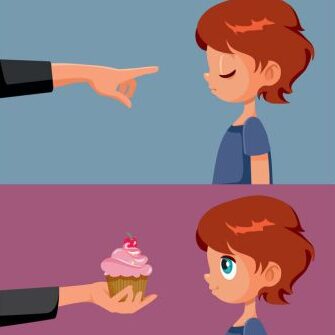
Rewards and punishments are a part of many behavior management programs taught to child care professionals and teachers. At first glance, they make sense. You offer incentives (rewards) to reenforce good behaviors and you impose disincentives (punishments) to move them away from bad behaviors. The goal is for the child to land on the behaviors you want them to display.
However, that isn’t how it ends up working over the long run. Let’s look at why.
There’s nothing inherently wrong with rewards, but they can have unintended consequences when they’re not used thoughtfully and intentionally.
When a reward is offered as an incentive, the reward becomes the focus and a judgement becomes attached. The child will get the reward WHEN and IF they do, say, or become a certain thing. That sets the stage for unhealthy pressure, increased fear of failure and disappointment, inauthentic behavior, and a reliance on external motivation to feel good about themselves.
Encouraging behaviors using rewards doesn’t lead to long-term changes either. They work well until the child decides the incentive isn’t worth whatever is required of them. You see this in a potty-training toddler who suddenly won’t sit on the potty, no matter how many M&Ms you offer. Or the teen who stops trying in his classes because hanging out with his friends is more important to him than the new video game you’re offering for every “A. Rewards give adults a false sense of control and soon or later, reality sets in.”
On the other hand, when a reward is given to acknowledge a child’s effort or achievement, it’s not based on a required behavior or outcome. Instead, it’s simply a way to say “I see you and appreciate you”. It sets the stage for pressure-free, genuine enjoyment of activities, a willingness to try new things (and possibly fail at them), and a real satisfaction and sense of accomplishment from their own efforts.